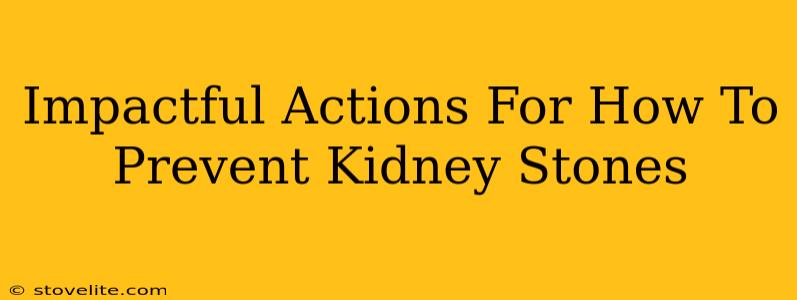Kidney stones. Just the words themselves conjure up images of excruciating pain. But the good news is, you have a lot of power to prevent these agonizing mineral formations from forming in the first place. This isn't about drastic measures; it's about making impactful lifestyle changes that can significantly reduce your risk. Let's dive into some practical, effective strategies.
Hydration: Your First Line of Defense
Drink plenty of fluids. This is the cornerstone of kidney stone prevention. Water is your best friend here. Aim for at least eight glasses a day, more if you live in a hot climate or exercise intensely. Why? Staying well-hydrated helps dilute urine, preventing minerals from concentrating and forming crystals.
Beyond water: Other fluids like unsweetened tea and juices (especially citrus) can contribute to your daily fluid intake. However, remember moderation is key; excessive juice can have downsides we'll discuss later.
Recognizing Your Hydration Needs
Don't just count glasses; pay attention to your urine. Light-colored urine is a good indicator of adequate hydration. Dark yellow or amber urine is a sign you need to drink more.
Dietary Tweaks for Kidney Stone Prevention
Limit sodium intake: High sodium diets can increase calcium excretion in urine, contributing to stone formation. Read food labels carefully, and choose fresh, whole foods over processed options whenever possible.
Moderate animal protein: While protein is essential, excessive intake of animal protein (red meat, poultry) can increase uric acid levels, a risk factor for kidney stones. Aim for balance; incorporate plant-based proteins into your diet as well.
Control your calcium intake: This one's tricky. While too little calcium can increase the risk of stones, so can too much. The key is balanced intake from a healthy, varied diet, rather than relying on calcium supplements unless specifically recommended by your doctor.
Reduce oxalate-rich foods: Oxalate is a compound that can contribute to kidney stone formation. While eliminating oxalate completely isn't necessary or always advisable, being mindful of your intake is beneficial. Foods high in oxalate include spinach, rhubarb, and chocolate. Again, moderation is key; enjoying these foods in small amounts as part of a varied diet is unlikely to cause problems.
Finding the Right Balance
The goal isn't to eliminate entire food groups, but to achieve a balanced diet rich in fruits, vegetables, and whole grains. Talk to a registered dietitian or nutritionist if you have specific concerns or need personalized dietary advice.
Lifestyle Choices That Matter
Maintain a healthy weight: Obesity is linked to increased kidney stone risk. Weight loss can help reduce the burden on your kidneys and improve overall health.
Regular Exercise: Physical activity helps maintain overall health and can indirectly reduce your kidney stone risk by supporting healthy weight management and possibly improving calcium metabolism.
When to Seek Professional Guidance
While these preventative measures are highly effective for most people, it's crucial to see a doctor if you have a history of kidney stones or experience symptoms like severe pain in your flank or side, nausea, vomiting, or bloody urine. They can help determine your individual risk factors and suggest personalized strategies.
In Conclusion:
Preventing kidney stones is achievable through a combination of conscious hydration, dietary adjustments, and a healthy lifestyle. By incorporating these impactful actions into your daily routine, you can significantly reduce your risk and safeguard your kidney health for years to come. Remember, consistent effort is key, but the rewards – avoiding excruciating pain and potential long-term health issues – are well worth it.

